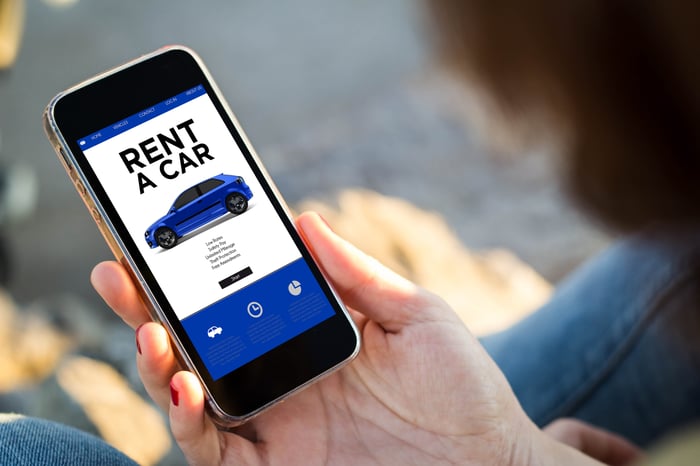This year will go down in the books as one that saw both the fastest and most brutal bear market decline in history, followed by an equally stunning recovery. Just months after the pandemic-induced sell-off that dominated the financial headlines in late February and early March, each of the major indexes has recovered most, if not all, of the losses. While the Dow Jones Industrial Average is still down about 3% so far in 2020, the S&P 500 is up about 4%, and the tech-heavy Nasdaq Composite is up an impressive 22%.
At the same time, the Robinhood investing app, which launched in 2015, has become immensely popular, particularly with younger, inexperienced investors. While some of these investors' favorite picks are certainly worthy of consideration, others are high-risk and should be avoided at all costs.
Let's look at three of the most highly traded stocks on the Robinhood app over the past month that are extremely risky and that investors should steer far clear of.

Image source: Getty Images.
1. Kodak's not a pretty picture
One of the most popular stocks among Robinhood investors over the past 30 days (ended Aug. 7) has been technology and pharmaceutical company Eastman Kodak (KODK -3.93%). A whopping 84,238 of the platform's investors have added Kodak to their portfolio in the past month, bringing the total to 93,643.
Robinhood investors were no doubt captivated by Kodak's recent rally. The company got word it had qualified for a $765 million loan from the U.S. government to produce vital coronavirus-related pharmaceutical components, sending the stock price soaring more than 1,400%. Even after losing more than half its value in recent days, the stock is still up more than 500% since late last month.
Unfortunately, the euphoria around the former film specialist is likely to be short-lived, due to the company's weak financial position and uncertain future. In the first quarter, Kodak reported revenue that fell more than 8% year over year to $264 million, resulting in a net loss of $111 million.
To add insult to injury, Kodak stock plummeted 28% on Monday, after its government loan was put on hold in the wake of an investigation by the U.S. Securities and Exchange Commission (SEC) into the possibility of insider trading.
Add to this the company's history of mismanagement (having missed the move to digital photography), and this could end up being a disastrous stock and one investors should avoid at all costs.

Theaters are likely to be risky investments for some time. Image source: AMC Theaters.
2. AMC Entertainment could fade to black
Another extremely popular stock among Robinhood investors over the past month is AMC Entertainment (AMC). An incredible 136,808 of the app's users have added AMC to their holdings in the past 30 days, bringing the total to 144,286.
Investors have likely been intrigued about the potential for catching the storied movie theater chain near the bottom and riding it higher once multiplexes open for business again. But the post-pandemic world will be very different, making AMC's recovery difficult at best.
The company has already made attempts to reopen its theaters, but the date has been pushed back several times. Most recently, AMC was planning to open the turnstiles in late July, only to be thwarted by the latest COVID-19 surge. The cinemas are now tentatively scheduled to try again in mid-August.
Even if cinemas do open, however, it will be difficult for AMC to maximize its profits. Many states still have social distancing guidelines in place, which means many seats will be vacant, putting further strain on AMC's already-burdened financial situation.
As of the end of the first quarter, AMC carried more than $5 billion in debt and less than $300 million in cash, having burned through $275 million during the quarter. The company has been working furiously to restructure its massive debt load and stave off bankruptcy.
It's tough for me to say as an AMC shareholder, but things have changed over the past few months, and I think investors should steer well clear of the stock. I'm even considering selling my own shares for a substantial loss, as the future remains uncertain.

Image source: Getty Images.
3. Driving off a cliff with Hertz
Another extremely popular stock among Robinhood investors over the past month has been Hertz (HTZG.Q). An incredible 147,918 of the app's users have added the stock to their holding in the past 30 days -- though it's worth noting that many of those who held the stock during the same period have come to their senses and headed for the exit, bringing the total to 138,701.
Robinhood investors were no doubt hoping to catch a turnaround for the beleaguered car-rental company, but this is an extremely risky move that could end up being catastrophic. The company filed for bankruptcy on May 22, making it one of the largest corporate casualties (thus far) of the economic fallout from the pandemic.
Yet even after its bankruptcy filing, shares initially surged on speculation -- even in the face of a potential delisting from the New York Stock Exchange -- with the stock increasing more than ninefold in just weeks. Hertz sought to capitalize on the newfound interest by issuing new shares, a move that the SEC shut down. The stock has since lost two-thirds of its value, leaving shareholders holding the bag.
Noted activist investor Carl Icahn sold a major stake in the company just a week after its bankruptcy filing, noting that while he had confidence in the company's management, the "extremely rapid and substantial decrease in travel" caused by the pandemic resulted in "major financial difficulties" that Hertz might not recover from.





